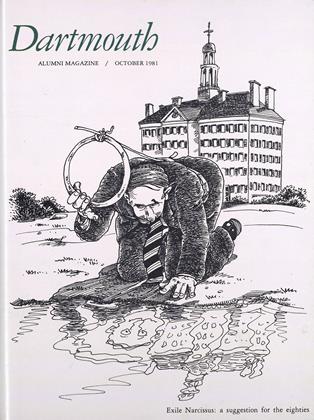About three-quarters of the students and a larger-than-usual contingent of the faculty turned out for convocation last month. Attendance at the ceremony opening the College year has not always been regarded by upperclassmen as a seemly thing; what appeared to draw them and the faculty to Thompson Arena this time was a desire to check out the new man in charge here.
The new man, President McLaughlin, told the audience that improving the quality of student life was a principal goal of his ad- ministration. At Dartmouth in recent years, the "quality of student life" has come to stand for a host of aspirations on the one hand and nettlesome problems on the other from such goals as broadened intellectual endeavor, a more varied social climate, and an increased diversity of viewpoints to worries over heavy drinking, student housing, and a .campus overloaded with automobile traffic. These" and other concerns have already been subjected to considerable official scrutiny, and McLaughlin promised the effort would be intensified.
The president did not outline any specific plan of action. He did, however, call on the students for their part to commit themselves to a heightened sense of responsibility, of conscience, of character. He warned them of the danger of confining the educational process "to the world of the classroom" and not extending it to the "world beyond that threshold." McLaughlin's mentor, President Emeritus John Sloan Dickey he was in the audience used to tell the students at convocation that "your business here is learning." This day, the 14th president reminded them that "at an institution committed to education, scholarly achievement is the highest recognition one can attain."
"You did not come to Hanover to develop the herd instinct," McLaughlin said in urging a rejection of "the image of Dartmouth as a place of excessive drinking, anti-intellectualism, and anti-social behavior. This is simply not reality, and where tendencies exist in these directions we must move together toward self-correction, for these characterizations are unworthy of Dartmouth and unworthy of men and women with the potential to take leadership roles in society."
The students did not seem to find these injunctions contrary to the "Dartmouth spirit." Their applause was more than perfunctory.
"MY whole attention is called to the tumults in the college. . . . Such a time was not since the beginning and 'tis truly hopeful never shall be again." Professor Roswell Shurtleff, on student life, 1804
 View Full Issue
View Full Issue
More From This Issue
-
 Cover Story
Cover StoryJust a suggestion, Mr. President: an agenda for the eighties
October 1981 -
 Feature
FeatureCarlos Fuentes: Of isolation, of connection
October 1981 -
 Feature
FeatureSubmariner
October 1981 By M. B. R -
 Article
ArticleDeaths
October 1981 -
 Article
Article1981 ALUMNI FUND CAMPAIGN
October 1981 -
 Article
ArticleWearers of the Green
October 1981 By Nancy Wasserman '77







